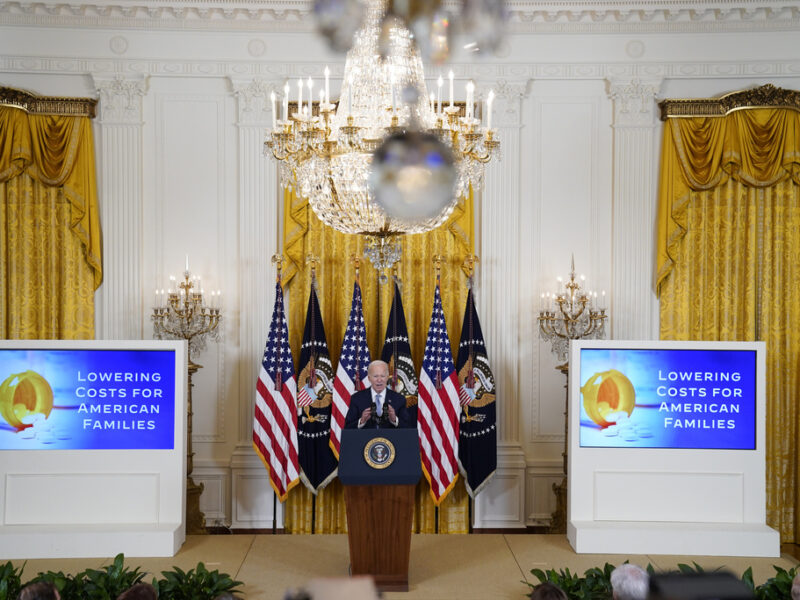Government Names First Medications to be Negotiated for Lower Prices
Biden administration announces 10 medications Medicare will negotiate with pharmaceutical companies
- Published In: Politics
- Last Updated: Aug 30, 2023

The Biden administration on Tuesday announced the first batch of 10 medications for which Medicare can attempt to negotiate a lower price with drug companies. (AP Photo/Evan Vucci)
By Jacob Gardenswartz
Special to the Wyoming Truth
WASHINGTON — The Biden administration on Tuesday announced the first 10 prescription medications tapped for price negotiations with pharmaceutical companies, a key step in the implementation of the Inflation Reduction Act (IRA)’s popular provision to lower drug costs for seniors.
Of those eligible for negotiations, the chosen medications represented some of the more expensive drugs taken by enrollees of Medicare’s Part D, the federal government’s prescription drug insurance program for Americans over 65 and others with disabilities. Used to treat diabetes, prevent blood clots and help with cancer and autoimmune disorders, the medications were taken by 9 million Medicare recipients last year and posed $3.4 billion in out-of-pocket costs to seniors, according to the Department of Health and Human Services.
In remarks from the White House Tuesday, Biden touted the announcement as a major step in his campaign against pharmaceutical companies’ alleged greed, noting they’ve fought to prevent such negotiations for decades.
“We’ve been fighting big pharma for a long time,” Biden told lawmakers and other advocates assembled in the East Room. “Finally, finally, finally we had enough votes, by matter one, to beat Big Pharma. Well, we did it.”
But while the president may be taking a victory lap, the negotiated prices won’t be available to consumers until 2026, and it remains unclear how much cheaper the drugs will be or if drug companies will even participate in negotiations.
Meanwhile, the pharmaceutical industry and GOP lawmakers have decried the policy, suggesting the changes will force companies to raise prices on other medications or cut back on research and development. In the year since the IRA was passed, eight companies sued the administration, seeking to have the provision struck down in court.
White House officials are projecting optimism that the legality of the negotiation provision will be upheld and that Americans will more immediately see the benefits of the legislation. They pointed to other provisions in the IRA which went into effect immediately, capping the cost of insulin at $35 a month and imposing penalties on pharma companies that raised drug prices faster than inflation.

“It’s been 30 years that people have been trying to get Medicare drug negotiation. I will say it is this president, President Joe Biden, that actually delivered it,” domestic policy advisor Neera Tanden told reporters at a White House briefing.
Savings for seniors, government
Americans spend more on health care than do residents of any other peer nation, and prescription drug costs are no exception. A 2022 report from the nonprofit research group the RAND Corporation found U.S. drug prices were on average 256% of those in the 32 comparison countries combined — ranging from 170% of prices in Mexico to 779% of prices in Turkey.
Because federal health insurance programs cover millions of Americans, the government has significant leverage to negotiate drug prices with pharmaceutical companies. Many branches of the government, including the Departments of Veterans Affairs (VA) and Defense, already do this — and Biden noted the VA spends on average 50% less on medications than Medicare does.
When the Medicare program was created in the 1960s, it only covered medications that were administered in a doctor’s office — so-called Part B coverage for treatments administered via specialized equipment. It wasn’t until 2003 that the Part D and similar Medicare Advantage programs were established, and to win the support of Republicans in Congress, the so-called “Medicare Modernization Act” was written with language explicitly prohibiting the government from negotiating prices with pharmaceutical companies.
The new law removes such restrictions, establishing a complicated formula and timeline for negotiations to take place. The government can name 10 drugs to be negotiated for 2026, 15 drugs each of the two years after that, and then 20 drugs each subsequent year starting in 2029. Only medications which don’t have competition from a cheaper, generic alternative are eligible to be negotiated.
It remains unclear how much Medicare beneficiaries stand to benefit from such negotiations.
“This is a true negotiation and that will be subject for this year-long conversation between [the Centers for Medicare and Medicaid Services] and the pharmaceutical companies,” Tanden said, though she added she expects the negotiations “will drive prices significantly lower.” Those companies which opt not to participate in negotiations will have to pay an excise tax up to 95% of the drugs’ U.S. sales or pull them from the federal insurance market altogether.
And it’s not just consumers who stand to benefit from the negotiations. The nonpartisan Congressional Budget Office estimates the negotiations will save Medicare about $100 billion over 10 years.
“Negotiating drug prices alongside other provisions of this law isn’t just going to put more money back in the pockets of millions of Americans across the country. It’s also going to lower the federal deficit,” Biden said.
How Wyoming stands to benefit
Over 11,000 Wyomingites on Medicare took one of the named drugs in 2022, federal figures show, with one of the medications — the cancer drug Imbruvica — costing recipients an average of $7,118 out-of-pocket last year. As such, consumer groups and healthcare advocates throughout the country and state celebrated Tuesday’s announcement.
“This is very good news for older Wyomingites. We’re all struggling with the increased cost of everything from groceries to gas to our electric bills,” Sam Shumway, director of the Wyoming AARP, told the Wyoming Truth in a statement. “Allowing Medicare to negotiate for the lowest prices is consistent with Wyoming values and it just makes sense.”
Shumway noted his organization helped pass a measure in the 2020 state legislative session requiring the Wyoming Department of Health to study prescription drug prices in the state and possible solutions to reduce costs.
The resulting report concluded that many of the proposals to lower costs were unfeasible, emphasizing that efforts to negotiate drug costs on the state level were especially difficult since “Wyoming’s small population likely precludes it from implementing any effective State-level purchasing solutions to lower overall drug costs.”
Meanwhile prescription drug negotiation remains one of the IRA’s most popular previsions, with public opinion research finding over eight-in-10 Americans back the policy, including 71% of Republicans.
Despite this, most Republicans in Congress — Wyoming’s representatives among them — opposed the IRA; leaders of three House committees with relevant jurisdiction released a memo on Tuesday attacking the negotiation provision as “Democrats’ drug price-setting scheme.”
Some Wyoming lawmakers have taken things a step further. Rep. Harriet Hageman (R-Wyo.) signed on to a measure to repeal the law and suggested cutting the budgets allocated to its implementation.
But Biden has shown no intentions of backing down.
“We’ll stand up to the ‘MAGA Republicans’ who voted against the Inflation Reduction Act, and now are attempting to still repeal it,” he said. “On my watch, health care should be a right, not a privilege in this country.”













